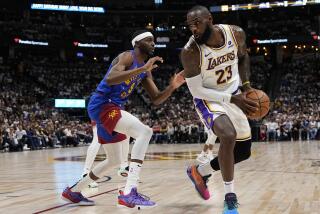Congress Urged to Make Broadcasters Pay License Fees for New Technology : Telecom: Digital TV frequencies could also be used to offer telephone, paging and other communications services.
- Share via
WASHINGTON — Enlisting tools from the Internet to cellular phone industry lobbyists, an unusual coalition of conservative and liberal groups is waging an 11th-hour battle in Congress to force broadcasters to pay for rights to digital TV airwaves that government officials say are worth billions of dollars.
Liberal consumer groups such as the Center for Media Education and fiscal conservatives such as the Washington-based Americans for Tax Reform say broadcasters should pay for digital television licenses that federal regulators plan to allocate next year.
The licenses were initially conceived as a way to enable broadcasters to make the transition to a new kind of high-quality TV known as high-definition television, which required additional radio spectrum. But the same frequencies could also be used to offer more channels--as many as five new ones for every traditional channel available today.
The technology, known variously as advanced television service, or digital TV, would also give broadcasters the flexibility to use the new licenses to offer paging, telephone and other communications services.
“The broadcast industry is getting ready to walk away with a huge treasure trove of cyber pork,” fumed Jeff Chester, executive director of the Center for Media Education.
The Federal Communications Commission this month will begin finalizing standards for digital TV, which offers ultra-sharp, wide-screen, theater-quality video and compact disc-like sound. The technology, hailed as the biggest video advance since color TV, is expected to give the United States thousands of new jobs as well as a huge technological lead over foreign rivals such as Japan, that are now saddled with older, less flexible analog television technology. A group calling itself the Campaign for Broadcast Competition has set up a Web page on the Internet hoping to ignite public ire over the issue. But the effort so far has done little to thwart the powerful broadcast lobby, which has won a loyal following on Capitol Hill thanks to million of dollars in political campaign contributions.
The cellular industry, whose telephone licenses were allocated for free through a government-run lottery more than a decade ago, has also joined up in the fight against broadcasters out of fear that owners with digital TV licenses could become potential competitors.
Thomas Wheeler, president of Cellular Telecommunications Industry Assn., would not comment on what role, if any, his organization was playing in the debate. But other industry sources said the cellular industry was optimistic that some members of the budget reconciliation committee appeared willing to reconsider the issue this week.
A spokeswoman for the National Assn. of Broadcasters, however, complained that auctioning digital TV licenses will place a financial burden on broadcasters who will also have to spend $2 million to $6 million each to equip their stations to air digital TV.
While most network-owned stations, as well as large broadcast station groups, could easily foot the digital TV tab, the NAB has won its strongest support from smaller station owners who see few financial benefits from offering digital TV given the upfront financial outlay.
It is unknown, of course, how much digital TV licenses would bring even if they were auctioned. Much would depend on whether the licenses could only be used to offer over air TV or could be used for any communications service, said Thomas W. Hazlett, a fellow at the conservative Washington think tank, the American Enterprise Institute.
The FCC has estimated that the licenses could have a market value of between $10 billion and $70 billion.
The digital TV license issue first gained visibility in late September when Senate Commerce Committee Chairman Larry Pressler (R-S.D.), under pressure from Republican leaders to find ways to alleviate the federal budget deficit, offered a plan to use spectrum auctions as a way of raising money. The committee approved a plan which expands the FCC current auction authority to include broadcast services.
But the effort suffered a major setback last month when Sen. John McCain (R-Ariz.) tried and failed to push through a budget amendment that would have specifically authorized an auction of digital TV licenses.
Now supporters of digital TV license sales are trying to pressure the congressional budget reconciliation committee to reconsider the issue and are also urging a 45-member congressional panel working to stitch together House and Senate versions of telecom reform legislation to approve an auction.
More to Read
Sign up for Essential California
The most important California stories and recommendations in your inbox every morning.
You may occasionally receive promotional content from the Los Angeles Times.













